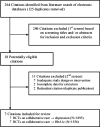Collaborative care for comorbid depression and diabetes: a systematic review and meta-analysis
- PMID: 24727428
- PMCID: PMC3987739
- DOI: 10.1136/bmjopen-2013-004706
Collaborative care for comorbid depression and diabetes: a systematic review and meta-analysis
Abstract
Objective: The collaborative care model is recommended for depression in adults with a chronic physical health problem like diabetes. We sought to systematically assess the effect of collaborative care on depression and glycaemia in adults with comorbid depression and diabetes to inform guidelines and practice.
Design: Systematic review and meta-analysis.
Data sources: We searched PubMed, Scopus, Cochrane Library, CINAHL, Health Source Nursing, MEDLINE, PsychINFO and reference lists of retrieved articles published before August 2013.
Inclusion criteria: Randomised controlled trials (RCTs) on collaborative care (ie, coordinated multidisciplinary model of care) for depression that reported the effects on depression and glycaemic outcomes in adults with comorbid clinically relevant depression and diabetes were eligible.
Data extraction and analysis: Data on the mean difference in depression and glycaemic outcomes were extracted and pooled using random effects meta-analysis.
Results: Seven RCTs included for review reported effects on depression outcomes in 1895 participants, and glycated haemoglobin (HbA1c) level in 1556 participants. Collaborative care significantly improved the depression score (standardised mean difference was -0.32 (95% CI -0.53 to -0.11); I(2)=79%) and HbA1c level (weighted mean difference was -0.33% (95% CI -0.66% to -0.00%); I(2)=72.9%) compared with control conditions. Depression remission did not predict better glycaemic control across studies.
Conclusions: Limited evidence from short-to-medium term RCTs predominantly conducted in the USA suggests that collaborative care for depression significantly improves both depression and glycaemia outcomes, independently, in people with comorbid depression and diabetes.
Figures




References
-
- Murray CJ, Vos T, Lozano R, et al. Disability-adjusted life years (DALYs) for 291 diseases and injuries in 21 regions, 1990-2010: a systematic analysis for the Global Burden of Disease Study 2010. Lancet 2012;380:2197–223 - PubMed
-
- International Diabetes Federation. IDF diabetes atlas. 5th edn © 2013 International Diabetes Federation, 2013
-
- Atlantis E. Excess burden of type 1 and type 2 diabetes due to psychopathology. J Affect Disord 2012;142(Suppl):S36–41 - PubMed
-
- Moussavi S, Chatterji S, Verdes E, et al. Depression, chronic diseases, and decrements in health: results from the World Health Surveys. Lancet 2007;370:851–8 - PubMed
Publication types
MeSH terms
Substances
LinkOut - more resources
Full Text Sources
Other Literature Sources
Medical
